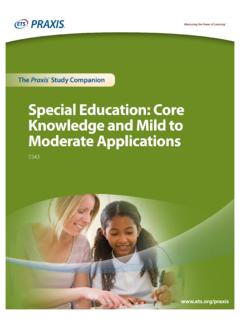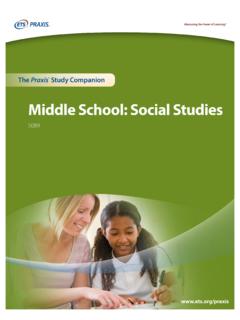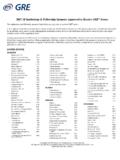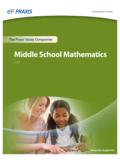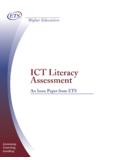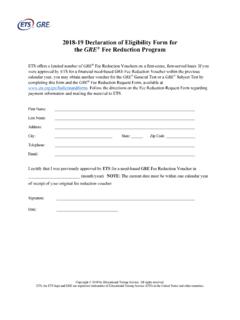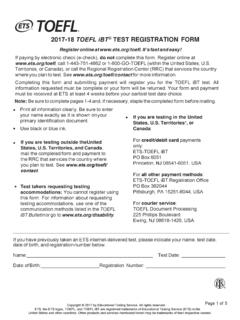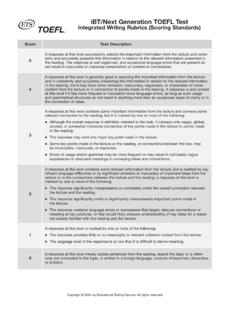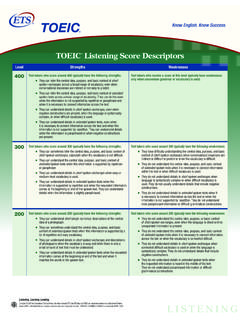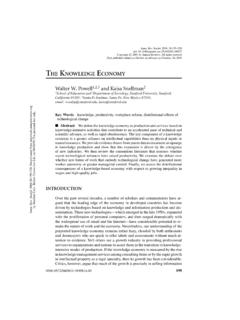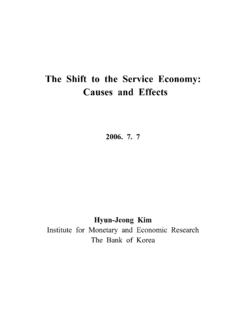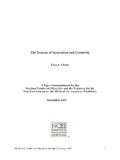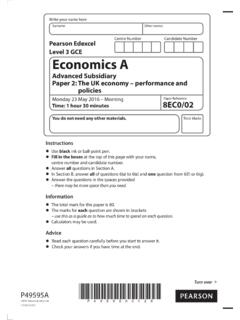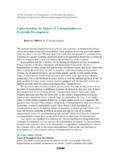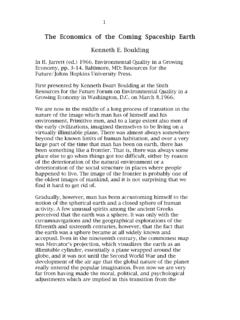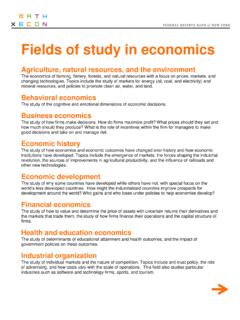Transcription of Social Studies: Content Knowledge Study Companion
1 The Praxis Study Companion Social studies : Content Knowledge 5081. Welcome to the Praxis Study Companion Welcome to the Praxis Study Companion Prepare to Show What You Know You have been working to acquire the Knowledge and skills you need for your teaching career. Now you are ready to demonstrate your abilities by taking a Praxis test. Using the Praxis Study Companion is a smart way to prepare for the test so you can do your best on test day. This guide can help keep you on track and make the most efficient use of your Study time. The Study Companion contains practical information and helpful tools, including: An overview of the Praxis tests Specific information on the Praxis test you are taking A template Study plan Study topics Practice questions and explanations of correct answers Test-taking tips and strategies Frequently asked questions Links to more detailed information So where should you start? Begin by reviewing this guide in its entirety and note those sections that you need to revisit.
2 Then you can create your own personalized Study plan and schedule based on your individual needs and how much time you have before test day. Keep in mind that Study habits are individual. There are many different ways to successfully prepare for your test. Some people Study better on their own, while others prefer a group dynamic. You may have more energy early in the day, but another test taker may concentrate better in the evening. So use this guide to develop the approach that works best for you. Your teaching career begins with preparation. Good luck! Know What to Expect Which tests should I take? Each state or agency that uses the Praxis tests sets its own requirements for which test or tests you must take for the teaching area you wish to pursue. Before you register for a test, confirm your state or agency's testing requirements at How are the Praxis tests given? Praxis tests are given on computer. Other formats are available for test takers approved for accommodations (see page 41).
3 The Praxis Study Companion 2. Welcome to the Praxis Study Companion What should I expect when taking the test on computer? When taking the test on computer, you can expect to be asked to provide proper identification at the test center. Once admitted, you will be given the opportunity to learn how the computer interface works (how to answer questions, how to skip questions, how to go back to questions you skipped, etc.) before the testing time begins. Watch the What to Expect on Test Day video to see what the experience is like. Where and when are the Praxis tests offered? You can select the test center that is most convenient for you. The Praxis tests are administered through an international network of test centers, which includes Prometric Testing Centers, some universities, and other locations throughout the world. Testing schedules may differ, so see the Praxis web site for more detailed test registration information at www. The Praxis Study Companion 3. Table of Contents Table of Contents The Praxis Study Companion guides you through the steps to success 1.
4 Learn About Your Learn about the specific test you will be taking 2. F. amiliarize Yourself with Test Become comfortable with the types of questions you'll find on the Praxis tests 3. Practice with Sample Test 13. Answer practice questions and find explanations for correct answers 4. Determine Your Strategy for 23. Set clear goals and deadlines so your test preparation is focused and efficient 5. Develop Your Study 26. Develop a personalized Study plan and schedule 6. Review Study 30. Review Study topics with questions for discussion 7. Review Smart Tips for 39. Follow test-taking tips developed by experts 8. Check on Testing 41. See if you qualify for accommodations that may make it easier to take the Praxis test 9. Do Your Best on Test 42. Get ready for test day so you will be calm and confident 10. Understand Your 44. Understand how tests are scored and how to interpret your test scores Appendix: Other Questions You May Have .. 46. The Praxis Study Companion 4. Step 1: Learn About Your Test 1.
5 Learn About Your Test Learn about the specific test you will be taking Social studies : Content Knowledge (5081). Test at a Glance Test Name Social studies : Content Knowledge Test Code 5081. Time 2 hours Number of Questions 130. Format Selected-response questions Test Delivery Computer delivered Approximate Approximate Content Categories Number of Percentage of Questions Examination I. United States History 26 20%. VI I. V. II. World History 26 20%. III. Government/Civics/Political Science 26 20%. IV II IV. Geography 19 15%. III V. Economics 20 15%. VI. Behavioral Sciences 13 10%. About This Test The Social studies : Content Knowledge test is designed to determine whether an examinee has the Knowledge and skills necessary for a beginning teacher of Social studies in a secondary school. The test is aligned to the National Council for the Social studies (NCSS) National Standards for Social studies Teachers. The test requires the examinee to understand and apply Social studies Knowledge , concepts, methodologies, and skills across the fields of United States history; world history; government/civics/political science; geography; economics; and the behavioral science fields of sociology, anthropology, and psychology.
6 A number of the questions are interdisciplinary, reflecting the complex relationships among the Social studies fields. Answering the questions correctly requires knowing, interpreting, and integrating history and Social science facts and concepts. The 130 equally weighted selected-response questions consist of no more than 60 percent Knowledge , recall, and/or recognition questions and no less than 40 percent higher-order thinking questions. Some questions are based on interpreting material such as written passages, maps, charts, graphs, tables, cartoons, diagrams, and photographs. Between 10 and 15 percent of the questions contain Content reflecting the diverse experiences of people in the United States as related to gender, culture, and/or race, and/. or Content relating to Latin America, Africa, Asia, or Oceania. This test may contain some questions that will not count toward your score. Note: This examination uses the chronological designations (before the common era) and (common era).
7 These labels correspond to (before Christ) and (anno Domini), which are used in some world history textbooks. The Praxis Study Companion 5. Step 1: Learn About Your Test Test Specifications Test specifications in this chapter describe the Knowledge and skills measured by the test. Study topics to help you prepare to answer test questions can be found on page 30. I. United States History N. Understands the ongoing impact of race, A. Understands basic North American gender, and ethnicity throughout American geography, peoples, and cultures prior to history European colonization O. Understands how participants in the political B. Understands how and why European process ( , presidents, the judiciary, colonies in North America were founded and Congress, political parties) engage in politics developed and shape policy C. Understands how European, African, and P. Understands the emergence of the United Native American peoples interacted in North States as a world power and the evolving America during the colonial period role of the United States in the world D.
8 Understands the origins of the American Q. Understands the influence of religion Revolution and its impact on the founding of throughout American history the United States R. Understands major economic E. Understands the United States Constitution transformations that occurred in the United and Bill of Rights, the context that led to their States ( , changes in technology, business, writing and adoption, and their impact on and labor). the political development of the early United S. Understands the causes and consequences States of changing patterns of immigration to the F. Understands the causes and consequences United States and internal migration within of territorial expansion of the United States the United States G. Understands the causes and consequences T. Understands the struggles and of nineteenth-century sectionalism, the Civil achievements of individuals and groups for War, and Reconstruction greater political and civil rights throughout United States history H.
9 Understands the relationships among industrialization, urbanization, and immigration in the late nineteenth and early II. World History twentieth centuries A. Knows the formation, organization, and I. Understands the political, economic, Social , interactions of the classical civilizations of and cultural developments from the Greece, Rome, Persia, India, and China in the Progressive Era through the New Deal period 1000 to 500 J. Understands the causes of United States B. Knows the main aspects of the participation in the First and Second World transformation of classical civilizations as a Wars and the consequences of the wars at result of invasions, trade, and the spread of home and abroad religions in the period 300 to 1400 K. Understands the origins, development, and C. Knows the major political, Social , and consequences of the Cold War both abroad economic developments in Europe from the and domestically Renaissance through the Enlightenment L. Understands the impact of Social , economic, D.
10 Knows the major political, Social , economic, and technological changes in the latter half and biological causes and effects of growing of the twentieth century ( , counterculture, global interactions, including trade, globalization, information age) exploration, and colonization in the period 1200 to 1750 M. Understands the political realignment from the New Deal and the Great Society through E. Knows the major causes and consequences the rise of conservatism of revolutions, nationalism, and imperialism in the period 1750 to 1914 The Praxis Study Companion 6. Step 1: Learn About Your Test F. Knows the major ideological, economic, and C. Understands comparative politics and political causes and consequences of the international relations: forms of government First and Second World Wars and the Cold ( , parliamentary, federal); major regime War ( , Russian Revolution, decolonization) types ( , democracy, autocracy); major G. Knows the major developments of the post types of electoral systems; foreign policy; the Cold War world ( , growth of the theories of international relations ( , globalized economy , rise of fundamentalism realism, liberalism); international relations in and nationalism) practice ( , conflict, cooperation, diplomacy); power and problems of H.
